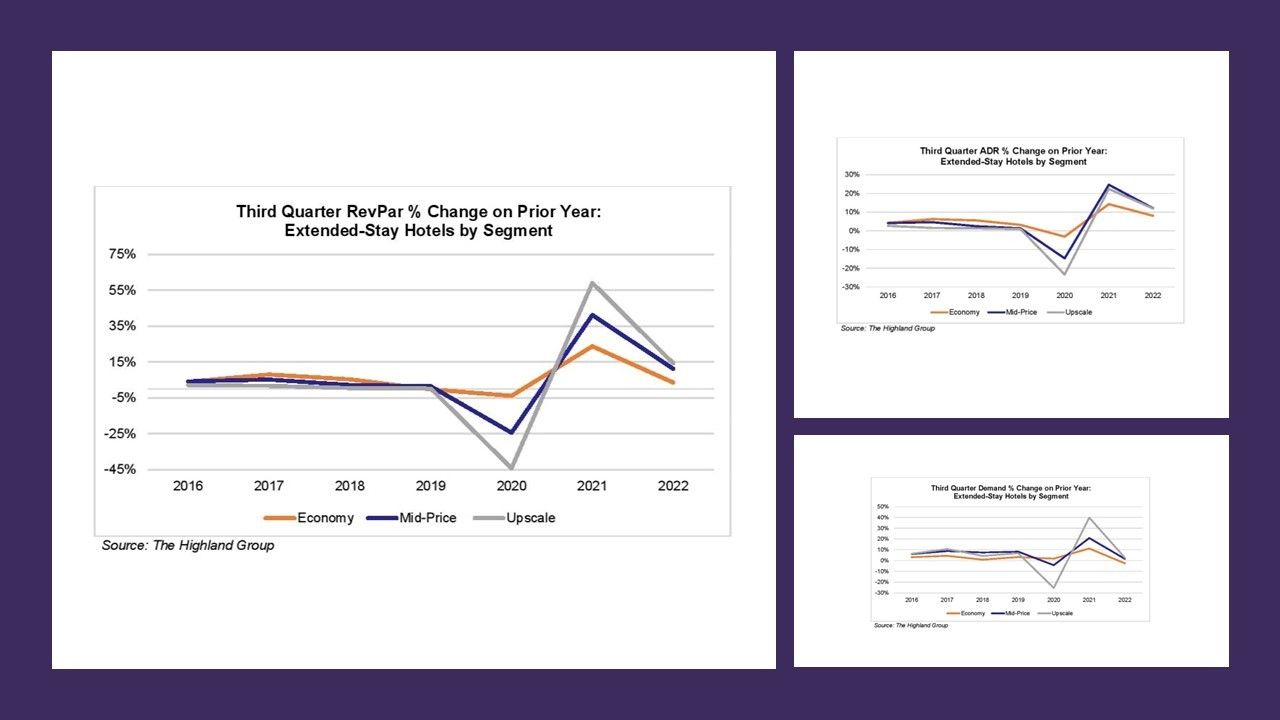
U.S. EXTENDED-STAY HOTELS set new performance records for demand, ADR and RevPAR in the third quarter of 2022, according to a report from The Highland Group. However, rate resistance is growing at lower price points as recession fears loom.
The “U.S. Extended-stay Hotels: Third quarter 2022” report by the Highland Group said that the economy extended-stay segment reported six consecutive months of demand drop and two successive quarterly falls in occupancy in the quarter ending September.
“Mid-price extended-stay hotels reported first quarterly decline in occupancy since fourth quarter of 2020. Excluding the last 15 months, extended-stay hotel ADR is still increasing at the fastest rate for 20 years but, like the overall hotel industry, ADR growth continues to decelerate,” the report said. “The slowdown in ADR growth is greatest at higher price points although mid-price and upscale extended-stay ADR is still increasing faster than the economy segment.”
Extended-stay supply growth for the quarter remained low but still slightly ahead of the change in demand.
“The last time extended-stay supply growth was at its current level was from fourth quarter of 2010 through third quarter of 2014,” the report said. “During the period, extended-stay hotel RevPAR was two years away from recovering to its previous high value set in 2007. Supply growth during this period stayed below its long-term historical average for 20 consecutive quarters.”
According to the report, extended-stay supply growth should be relatively low across the U.S. for three to four years with rising interest rates and construction costs. As many as 565,525 extended-stay hotel rooms were opened during the period. However, the 8,162 net gain in rooms in the third quarter compared to last year was the lowest annual increase since 2012. Room nights available increased 1.5 percent over the last year which was the smallest annual gain in supply for nine years.
“Mid-price and upscale extended-stay hotel segments reported record high demand in the quarter. Economy segment demand declined 2.5 percent compared to the same period last year. The rate of increase in room revenues has fallen since the substantial gains made following 2020. Third quarter gains were generally in line with those made from 2016 through 2019 and all extended-stay segments reported record high room revenues in the third quarter,” the report said.
“Overall extended-stay hotel occupancy declined marginally from July to September, the first such contraction since first quarter of 2021. Upscale extended-stay hotels, which are still rebuilding occupancy back to the high levels achieved from 2015 through 2019, were the only segment reporting occupancy growth in the quarter compared to last year. All extended-stay segments reported record high third quarter ADR this year. Rate increases have moderated since 2021 but remain higher than during the four years preceding the pandemic.”
The 11.9 percent increase in RevPAR in the third quarter was the smallest gain since the first quarter of 2021 when RevPAR contracted almost 16 percent. Extended-stay hotel’s occupancy premium above the overall hotel industry ranged from 11 percent to 13 percent from 2015 through 2019, almost within the range in the past two decades, the report added.
“Extended-stay hotels increased ADR faster than the overall hotel industry from 2015 through 2019. Relative RevPAR followed a similar trajectory, accelerating gains made from 2015 through 2019 and peaking at a ratio of 115 percent in the third quarter of 2020. As the overall hotel industry recovered RevPAR more quickly, extended-stay hotel’s RevPAR ratio declined to 88 percent in the third quarter which is about the same as the period from 2015 through 2019,” the report said.
Economy extended-stay hotel’s 123 percent RevPAR recovery ratio compared to 2019 is the highest in the hotel industry in the third quarter. Mid-price extended-stay hotels have fully recovered RevPar to its nominal 2019 level and are one of the hotel industry’s strongest performing segments. They have also made gains when compared to all mid-price hotels, the report said.
Meanwhile, upscale extended-stay hotels are lagging the overall extended-stay recovery at 101.4 percent due to high concentration of rooms in urban sub-markets. Upscale extended-stay hotels have also lost RevPAR relative to all upscale hotels since 2019.
In the first two quarters of 2022, U.S. hotels overall were catching up with extended-stay hotels in terms of recovery, The Highland Group reported.





